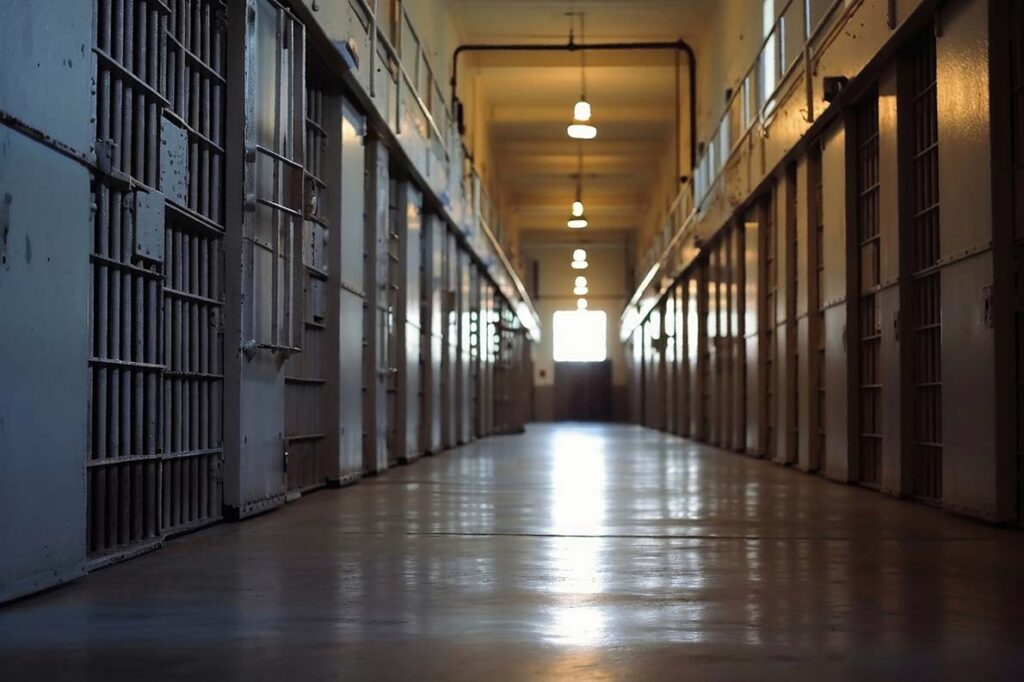
TL;DR
Jail holds those awaiting trial or serving short sentences, while prison is for long-term incarceration after conviction. Prisons are more secure, with stricter rules and more programs. To avoid both, seek legal counsel, negotiate plea deals, and explore alternatives like community service. Bail Hotline offers assistance for pre-trial release.
If you or a loved one is facing criminal charges, it’s important to understand the difference between jail and prison.
Jail is usually a facility that primarily holds people who are awaiting trial, while prison is for those who have been convicted of a crime. However, there are exceptions in this jail vs prison definition that we’ll explain later on in this blog.
In addition, there are differences in the way inmates are treated in jail and prison. Keep reading to learn about the differences between jail and prison, as well as how to stay out of either one!
What is Jail?
A jail is a short-term holding facility for the newly arrested and those awaiting trial or sentencing. Jails are usually local facilities under the jurisdiction of a city, local district, or county.
In other words, jails are generally operated by local governments as opposed to state or federal governments. However, the federal government also operates facilities that primarily hold pre-trial detainees and those serving short sentences among its many federal prisons. These are not officially called jails, but serve a similar purpose as jails.
One key distinction to keep in mind is that some people convicted of crimes may be kept in the local jail for the rest of their sentence. Prisoners are often placed in a local jail as opposed to a state prison when their sentence is one year or less in length.
Most jails are run by the local sheriff’s office or equivalent law enforcement agency. Jails tend to house fewer inmates than prisons. Here’s one more important jail and prison difference: Jails are often less secure and restrictive than prisons, with fewer guards and less stringent rules.
What is Prison?
On the other hand, prisons are long-term facilities run by the state or federal government.
Those who have been convicted of a state offense are generally incarcerated in a state facility, while those who have committed federal crimes are usually imprisoned in a federal institution somewhere in the United States.
Inmates in prison are typically serving sentences of more than one year. Some of these inmates, although not all of them, are convicted of serious crimes. That, and the lack of pre-trial detention at most prisons, is key to understanding the difference between jail and prison.
Prisons are generally more strict than jails, with more rules and regulations that inmates must follow.
In some states, there are privately operated jails and prisons. The state contracts with these private facilities to house prisoners. This means that the state does not have as much control over running the facility on a direct or day-to-day basis. However, the state does still have control over the facility in the big picture.
There is also typically a more significant divide between the guards and inmates in prisons than in jails. Inmates in prison also have less freedom than those incarcerated in jail.
Inmates in prisons are usually assigned specific jobs or tasks to complete during their time in prison. They are only allowed to leave their cells for specific reasons and at specific times.
What is the Difference Between Jail and Prison?
There are a few key differences between jail and prison:
- Jails are usually local facilities while prisons are typically operated by the state or federal government.
- Jails are typically used to hold people who have been charged with a crime but have not yet been convicted, and those serving shorter sentences of one year or less. Prisons, meanwhile, are for people who have already been convicted of a crime and are serving longer sentences.
- Prisons usually offer more services and programs than jails, such as educational opportunities and job training. This aligns with the longer-term nature of incarceration in prison vs jail.
- Prisons are more secure than jails, with more guards and security features.
- Jails are typically smaller than prisons, housing fewer inmates and people in pre-trial detention.
How to Stay Out of Both Jail and Prison
The best way to stay out of jail or prison is to avoid being charged with a crime in the first place. If you are charged with a crime, try to get it reduced to a lesser charge. This is never guaranteed, but is possible with support from a public defender or attorney you hire personally.
If you are convicted of a crime, try to get a sentence that does not involve jail or prison time. In some cases, pleading guilty before a trial can lead to a plea bargain. In exchange for an admission of guilt, it’s possible to reduce the penalties placed on you. In certain instances, that can mean eliminating time in prison or jail and instead completing community service
If you are being charged with a crime, contact Bail Hotline Bail Bonds today to learn about your options.